| Reviews & Columns |
|
Reviews DVD TV on DVD Blu-ray 4K UHD International DVDs In Theaters Reviews by Studio Video Games Features Collector Series DVDs Easter Egg Database Interviews DVD Talk Radio Feature Articles Columns Anime Talk DVD Savant Horror DVDs The M.O.D. Squad Art House HD Talk Silent DVD
|
DVD Talk Forum |
|
|
| Resources |
|
DVD Price Search Customer Service #'s RCE Info Links |
|
Columns
|
|
|
Essential Jacques Demy: Criterion Collection, The
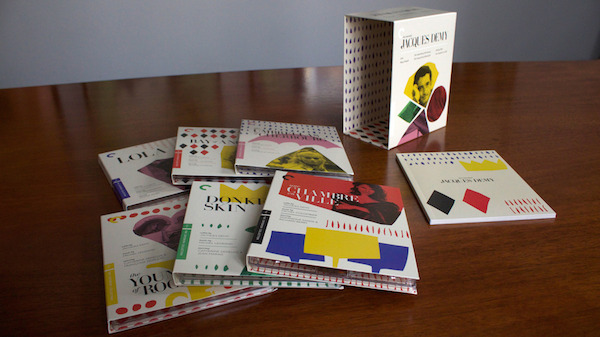
The tension between reality and fantasy is at the heart of Jacques Demy's films. Viewers reflecting on his work are likely to think about his use of vibrant color, stories told through singing, and characters whose passions are larger than life. Then again, they might be as likely to focus on his fondness for sad endings, characters who are single mothers, or the hinted-at militarism and violence that underscores the main action of many of his films. Many writers tend to want to pigeonhole Demy as a maker of candy-colored confections, but if there's anything that Criterion's wonderful new box set The Essential Jacques Demy shows, it's that Demy is not just a one-trick pony.
Criterion packaged this box in a manner similar to their World Cinema Project collection: six features (plus four short films and oodles of bonuses) are presented on six Blu-rays and seven DVDs, housed in 6 digipaks, with a beautiful accompanying 68-page booklet that includes essays on each of the films.
Lola
Content:  Video:
Video:  Audio:
Audio:  Special Features:
Special Features: 
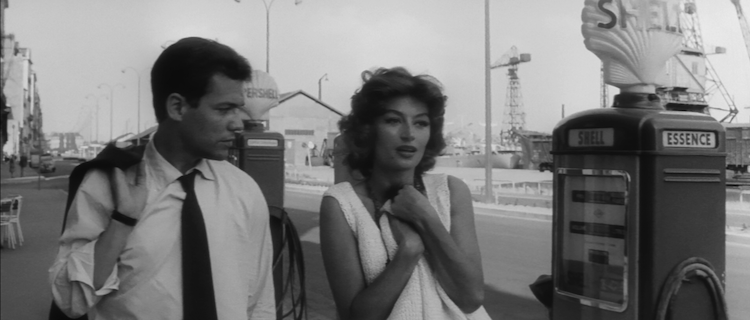
Demy's 1961 debut feature might have the superficial appearance of a different sensibility from his more famous later films, but Lola already has all the elements we expect from a Demy film in place: hopelessly romantic characters, storytelling that suggests a melancholy fairy tale, some dancing, some singing, and plenty of beautiful women. Roland (Marc Michel) is a young idealist who gets fired from his job by admitting to his boss that he was too busy reading a meaningful book to bother to show up to work on time. Cécile (Anouk Aimée) is Roland's old childhood friend who currently makes her living dancing in a cabaret under the stage name Lola. They meet on the street after fifteen years apart and, over the course of two days, they make furtive attempts at reconnecting. During this time, an American sailor named Frankie (Alan Scott) and a precocious young girl who is also named Cécile (Annie Duperoux) also vie for time with "Lola" and Roland respectively and end up spending time talking with each other as well. Within all of the film's potential pairings (young Cécile's mother and Roland, Roland and Lola, Lola and Frankie, Frankie and young Cécile), romantic connection is thwarted because one member of the pair is too busy pining for someone else. For example, Lola wants a friend but she rebuffs Roland's romantic advances because she is waiting for her first love -- the father of her son -- to return to her. Demy plays out this dynamic as neither farcical nor melodramatic. Despite the tidiness of his plotting, the film has a very matter-of-fact tone. Raoul Coutard's unfussy cinematography, which often employs high contrast natural lighting and elaborate but economical camera movement, helps Demy to straddle this line between earthy realism and lush romanticism.
Aimée says in an interview in the bonus features that Demy incorporated elements of her own behavior into the performance of Lola, but that he also kept suggesting Lola is like Marilyn Monroe. Aimée's performance has the same effervescence and glamour one associates with Monroe, complete with the suggestion that all this bubbliness is a shield against revealing too much of her pain. In the middle of the film, Lola rehearses her signature song, complete with a routine full of sensual come-hither body language, but the lyrics betray the fact that Cécile can only reveal her true self to one (absent) man. Roland thinks he is in love with Cécile (or Lola), but whatever way you slice it, he is in love with an image.
Lola: The Video:
The film negative of Lola was destroyed in a fire, so Demy's family had to track down the best prints they could find to create new materials to make a digital master. The AVC-encoded 1080p 2.35:1 transfer that was made from this cobble is quite good, but not great. It certainly shows signs of digital fiddling and often appears to be scrubbed of film grain. Raoul Coutard's idiosyncratic cinematography doesn't always translate here, with details seemingly getting lost in blown-out whites and crushed blacks. It's not constant, but it's frequent enough to gives new viewers a heads-up. This transfer is not as disappointing as The Housemaid from Criterion's World Cinema Project collection, but it's not a pristine presentation.
Lola: The Audio:
The LPCM French mono audio (with optional English subtitles) is a top-notch restoration job, with no significant damage audible. No surface noise or hiss. The dialogue sounds great for its age, as does Michel Legrand's wonderful musical score.
Lola: Special Features:
(HD, 3:27) - Two extremely brief interview clips by Demy's wife, filmmaker Agnès Varda. The first is taken from The World of Jacques Demy (see the Une Chambre En Ville features below), and the latter is a new 2012 interview. In both, Aimée talks about how Demy used the actress's real-life personality to help shape the character of Lola.
Bay of Angels
Content:  Video:
Video:  Audio:
Audio:  Special Features:
Special Features: 
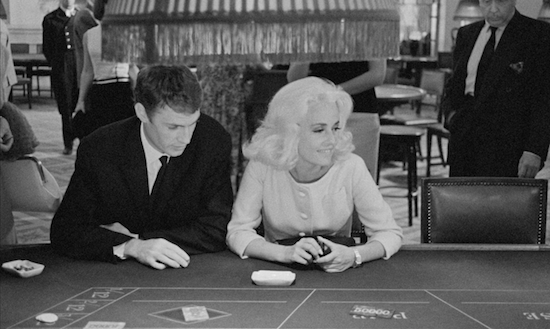
1963's Bay of Angels is probably the most naturalistic film in this collection, and the one that most resembles the work being turned out around this time by Demy's French New Wave peers Jean-Luc Godard and François Truffaut. The presence of Jeanne Moreau, who made an indelible impression as Catherine in Jules and Jim the previous year, further intensifies the New Wave aura around the film. This time, Moreau sports a bleach-blonde hairstyle that suggests her character Jackie, much like Lola in the previous film, is hoping to emulate the glamour of Marilyn Monroe. It works, because neophyte gambler Jean Fournier (Claude Mann, Army of Shadows) is quickly intrigued and infatuated with Jackie moments after seeing her getting kicked out of a casino. Jean is a bank employee who has started gambling at the insistence of a coworker who is clearly addicted. Jean is a natural, with good instincts, but he's cautious; he often leaves a roulette table before his luck can turn, so that he stays ahead. That's what makes his sudden attachment to Jackie so illogical. Though she is a gambling veteran, she is no more an expert than Jean. On top of this, her luck is typically bad and her instincts are terrible. Not to put too fine a point on it: she is a bad bet for Jean.
The difference in the characters' points of view is clear: Jean is a working stiff who thinks of gambling and living it up on the Riviera as his last fling before he inevitably settles into a boring bourgeois existence, while Jackie is a lifer who thrives on the delirious highs and fatal lows of the lifestyle. Jean thinks he can bring Jackie back to normal life with him, but she knows that that sort of set-up wouldn't work out in the end. Demy is not cynical in his portrayal of their relationship, though. Clearly, Jackie is using Jean for his good luck, but there is a genuine connection there too. Moreau knows how to deliver a particular blend of sensuality, frivolity, and seen-it-all worldliness, which helps make Jackie more than a doomed one-note junkie or con artist. Mann's performance is flatter, but it fits the square precociousness and naivete of the young Jean, who hasn't yet found his footing in the world.
Though Bay of Angels has the most intimate, natural style of any of the films in this set, it also oddly has the most optimistic ending. Whether or not Jean and Jackie have a romance that will last the test of time is highly debatable, but they manage to make it through the final fade-out -- which is more than can be said of the lovers in the film Demy made just before and just after this one.
Bay of Angels: The Video:
This time, it is clear that the digital image restoration was done from the original camera negative, because the clarity on this AVC-encoded 1080p 1.66:1 transfer is incredible. Plenty of fine detail, no dirt or damage, inky blacks, and a pleasantly nuanced range of contrast. This is the quality one expects from Criterion.
Bay of Angels: The Audio:
Once again, the LPCM French mono audio (with optional English subtitles) has been restored well. No damage or surface noise. Legrand's music helps add to the atmosphere of intoxicating indulgence within the casinos and sounds great here. Worth noting: the low-rent hotel used early in the film appears to be a practical location, and some of the dialogue recorded there is fairly echo-y. On the other hand, it gives those scenes a certain vérité edge, and clearly Demy originally chose to stick with those tracks rather than re-record, so I find no reason to complain about the way it plays now.
Bay of Angels: Special Features:
(HD upconverted from SD, 13:47) - An excerpt from a 1963 TV show. Moreau is interviewed on the set of Bay of Angels, and some on-set footage is shown. The interviewer sticks to questions with a fairly lightweight, gossip-y bent to them, making this more interesting as a time capsule than as a meaningful supplement.
The Umbrellas of Cherbourg
Content:  Video:
Video:  Audio:
Audio:  Special Features:
Special Features: 
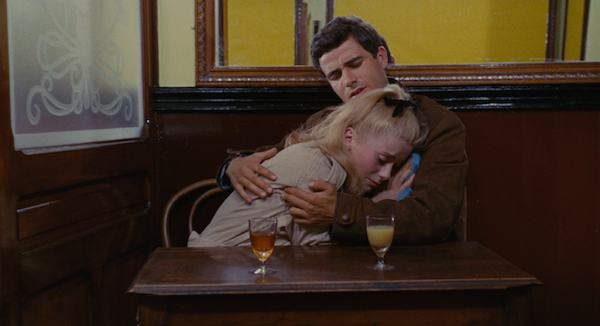
1964's The Umbrellas of Cherbourg is probably the best-known film in this set and for good reason. The great-looking cast, the colorful design and photography, the indelible jazz-pop score... these all continue to be utterly impressive. In fact, it's tempting to dub the film a masterpiece, if only because Demy succeeds brilliantly in realizing his ambitions to have an emotionally engaging fully-sung film, in the style of an opera, where even asides like "I should have changed my shoes" are agreeably set to a melody. Unfortunately, I am forced to stop short of "masterpiece," if only because Demy's attempt to blend reality and fantasy isn't always as deft as it could be.
The film starts off perfectly, with young lovers Geneviève (an impossibly young Catherine Deneuve) and Guy (Nino Castelnuovo, probably the best of Demy's dark-and-handsome leading men), living their ordinary lives. Geneviève works in her mom's umbrella shop while Guy is a mechanic ("You smell like gas," Geneviève memorably sings early in the film). They plan on getting married, but Guy gets drafted into the Algerian War. Geneviève claims she'll wait, but soon the bills at the umbrella shop pile up, Geneviève finds out she's pregnant, and the dashing Roland Cassard (Marc Michel -- repeating his role from Lola) offers to make all of it better by marrying her. She accepts. When Guy returns from the war, he finds a different Cherbourg waiting for him.
It's easy to imagine the Jacques Demy of Lola telling this story and making it intimate and devastating and perfect, but we've got a more experimental Demy here. Now don't get me wrong: I don't fault the effort. There is so much to outright love about the film, from the boldly wallpapered rooms by production designer Bernard Evein that frequently play off the colors and designs of costumer Jacqueline Moreau to the alternately hummable and tearjerking themes of composer Michel Legrand. These achievements make watching and re-watching Umbrellas consistently jaw-dropping. But the mixture of these stylized, effervescent audio-visuals with the film's more grounded, frankly downbeat plotting and acting leaves a queasy feeling in my stomach. Not that the film fails to leave me an emotional wreck, totally swept up in the lives of the characters, when the final scene fades out. I am. I just find myself thinking back, wishing that Demy had pushed it even a little more -- toward reality or toward fantasy. Demy's next film chose the latter route, and, in some ways, it's a stronger film for that very reason.
The Umbrellas of Cherbourg: The Video:
A truly meticulous restoration has been undertaken to create the source for this AVC-encoded 1080p 1.85:1 transfer. The print is completely free from damage, but it still has a pleasing film grain structure. The colors are vibrant but never bleed, while the skin tones are perfectly lifelike. The transfer offers plenty of fine detail with no discernible compression issues. Just perfect.
The Umbrellas of Cherbourg: The Audio:
The only audio option is a DTS-HD MA French 5.1 surround mix (with optional English subtitles), which makes Michel Legrand's music more expansive -- especially during the romantic orchestral passages -- without gimmicky directional effects. The mix is otherwise free from defect and sounds much better than you might expect a fifty-year-old movie to sound.
The Umbrellas of Cherbourg: Special Features:
(HD upconverted from SD, 54:24) - A 2008 documentary that features a mixture of new interviews with Agnès Varda, Michel Legrand, Catherine Deneuve, Marc Michel and archival interviews with Demy. As is typical with these Once Upon a Time docs, talking heads discussing the historical and cultural context of the film are also included.
The Young Girls of Rochefort
Content:  Video:
Video:  Audio:
Audio:  Special Features:
Special Features: 
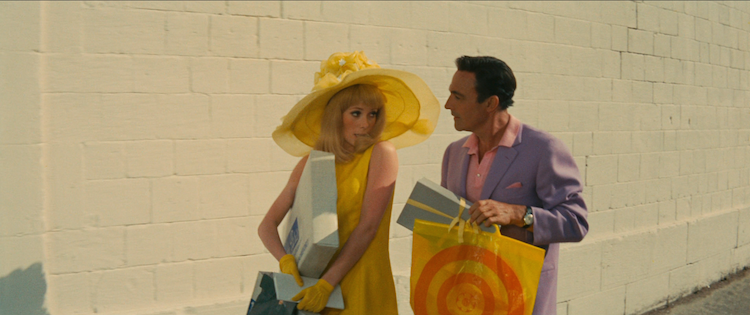
Though The Umbrellas of Cherbourg was a movie musical/opera hybrid, 1967's The Young Girls of Rochefort goes for the movie musical gusto: All Talking! All Singing! All Dancing!, just like the title of John Springer's book on Hollywood musicals which Demy is shown reading in some of the bonus materials. Rather than create an alternate reality where characters sing every sentiment, Demy embraces the artifice of switching from dialogue to song and back again, while passersby on the pastel streets break into elegant choreography. Demy, who likes to pay homage through casting, makes his influences clear by finding roles for West Side Story's George Chakiris and Singin' In The Rain's Gene Kelly, as a carny and a famous American composer respectively.
Twins Delphine and Solange (real-life sisters Catherine Deneuve and Françoise Dorléac) teach dance and music to children. They dream of skipping out on small-town life and finding fulfillment (and maybe some boyfriends) in Paris. Little do they know that their perfect romantic matches are in town right now. For Delphine, there's sailor Maxence (Jacques Perrin), who fancies himself a painter and a poet, and who has painted a portrait of Delphine as his feminine ideal without ever having met her. For Solange, there's Mr. Come-On-With-The-Rain-I've-A-Smile-On-My-Face, who bumps into her on the street and is captivated by one of her compositions, based on some sheet music that falls out of her bag. The film piles on the subplots, with the twins' mother pining for a former love who has just opened a music shop in town, traveling carnies looking for ladies to perform at the fair with them, and even a bit of axe murder.
The Young Girls is the frothiest of soufflés, anchored by Demy and Michel Legrand's catchiest set of songs. The cast, which also includes Danielle Darrieux and Michel Piccoli, seems to be having a wonderful time and it's contagious. Running over two hours, The Young Girls can feel like overstuffed overkill, especially in the final twenty minutes, but it's never less than charming and at its best, it's transcendent.
The Young Girls of Rochefort: The Video:
I spotted a few minor moments of instability in this AVC-encoded 1080p 2.35:1 transfer, but otherwise this is another top-notch restoration, with no visible damage, excellent color reproduction, and a high level of fine detail. I also noticed no significant compression issues.
The Young Girls of Rochefort: The Audio:
Once again, we are provided with a DTS-HD MA French 5.1 surround mix (with optional English subtitles) that nicely expands the sonic space of Michel Legrand's music. Not a lot of effort has been made to create an immersive surround atmosphere during the dialogue sections, but it doesn't truly detract from the experience.
The Young Girls of Rochefort: Special Features:
(HD upconverted from SD, 11:02) - An excerpt from a 1966 TV show, which begins with amazing fly-on-the-wall footage of Demy and Legrand working out a section of music. Then, the pair sit down for a more traditional but incredibly charming interview to discuss their approach to music in this film. Legrand gets fittingly petulant when the interviewer repeats the cliché about a film score being music you should never hear (The Cinépanorama interviewer asked the same thing, in the clip included with the last film, with similar results).
Donkey Skin
Content:  Video:
Video:  Audio:
Audio:  Special Features:
Special Features: 
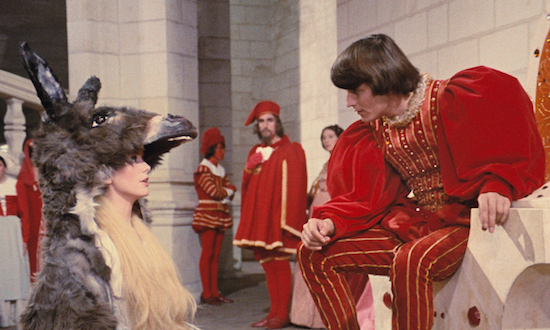
The set chooses to skip over Demy's Hollywood debut, the "Lola in L.A." drama Model Shop (not a bad decision), and goes straight to his French fairy tale from 1970, Donkey Skin. Demy was reportedly trying to evoke Cocteau's Beauty and the Beast -- and certainly his casting of the Beast, Jean Marais, points toward that being the case -- but the end result is often much sillier than his influences. Based on a well-loved story by Charles Perrault that hinges on the threat of incest, Donkey Skin is essentially an odd variation on Cinderella. The Queen (Catherine Denueve) has died, but not before telling the King (Marais) that he should remarry someone more beautiful than she. The King's men find only one princess to meet that criterion: his daughter (also Deneuve). Seeing no problem with this, the King starts making plans for the wedding. Even though she has a weakness for her Papa, the Princess takes the advice of her Fairy Godmother (Delphine Seyrig) and tries to come up with impossible tasks for her father to perform before she will marry him, climaxing with a request for the skin of his prized donkey that defecates gold and jewels (the French are weird). Unfortunately, the King makes good on all of her seemingly impossible requests, so the Princess runs away dressed in the donkey skin and becomes a scullery maid. Circumstance leads to her catching the eye of a Prince Charming (The Young Girls of Rochefort's Jacques Perrin), who can see her for who she is... blah blah blah... he ends up with her ring and declares that he will marry whatever girl in the kingdom has a finger small enough to fit the ring.
Because of its conventional storybook nature, Donkey Skin is the least exciting film in this set. The midtempo songs by Michel Legrand that pop up here and there help to pleasantly pass the time, and Demy has quite a few clever visuals up his sleeve, such as his realization of the Princess's request for a dress that is "the color of the weather" or an anachronistic gag in the final scene that probably matches Time Bandits in the realm of left-field conclusions. The cast also helps immensely, especially Perrin, whose charm lifts the film's sagging middle and keeps it up until the end. The climactic ring-fitting sequence is also quite funny. In the end, Donkey Skin is a good movie, but not one that rewards revisiting as much as the other films in this collection do.
Donkey Skin: The Video:
It's a little surprising to see that this film has the same cinematographer (Ghislain Cloquet) and designers as The Young Girls of Rochefort, because Donkey Skin looks kind of like a Christopher Reeve-era Superman movie, as set-designed by Wes Anderson. It doesn't look that great. Nonetheless, the AVC-encoded 1080p 1.66:1 transfer is on par with the other excellent color transfers in this set, apart from many of the effects shots, which have been duped down a generation.
Donkey Skin: The Audio:
Just like with The Young Girls, the DTS-HD MA French 5.1 surround mix (with optional English subtitles) mostly benefits Michel Legrand's songs, but there are not that many of them this time. The dialogue is crisp, with good fidelity, and it's right up front for most of the film.
Donkey Skin: Special Features:
(HD upconverted from SD, 11:45) - A well-made, black-and-white excerpt from a 1970 TV show, which shows a little bit of on-set footage and features interviews with Demy, Deneuve, and Marais. Demy talks about how he did Donkey Skin as a puppet show when he was young and has always thought of doing a film version. He also discusses how kids don't focus too hard on the incest angle of the story.
Une Chambre En Ville
Content:  Video:
Video:  Audio:
Audio:  Special Features:
Special Features: 
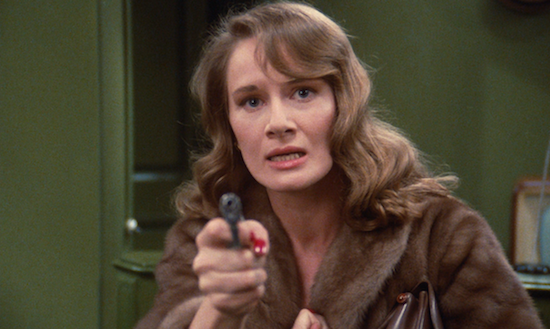
Now the box skips a full decade ahead -- past hippie pied pipers, pregnant men, and ladies named Oscar -- to 1982's Une Chambre En Ville. Another opera -- this time, gravely tragic, in vein of Bizet's Carmen -- Une Chambre is set during a metalworkers' strike in the '50s, in Demy's hometown of Nantes. Guilbaud (Richard Berry) is a striker, who rooms with a wealthy woman he nicknames "The Baroness" (Danielle Darrieux). Before long, Guilbaud is thinking of ditching his boring girlfriend Violette (Fabienne Guyon), in favor of The Baroness's sexually unsatisfied daughter, Edith (Dominique Sanda). Her impotent husband Edmond (Michel Piccoli, with laughably dyed red hair and beard) is rightfully suspicious that Edith is playing around and begins violently waving around a switchblade when the subject of infidelity comes up.
Looking online, I am clearly in the minority when I say that I found Une Chambre to be a disappointment. It's hard for me to appreciate what Demy is attempting because this time he has peopled his film with thin, mostly unlikable characters. Sure, Richard Berry is handsome, but his character is no match for Umbrellas of Cherbourg's Guy in terms of brooding appeal. I might have even been able to look beyond the predictable plotting if Michel Colombier's score had a few more memorable melodies. Instead, Colombier's work is a weird mash-up of grand orchestral music and awfully dated soft-rock.
That said, the film is a fascinating misfire full of stand-out moment. I suspect Une Chambre will reward rewatching some time in the future... although, given the choice, it's most certainly not going to be the first film in this set that I'm going to pull off the shelf and pop in the player again.
Une Chambre En Ville: The Video:
That outlandish Jacques Demy/Bernard Evein wallpaper is back, although cinematographer Jean Penzer does not let it pop out like his predecessors did. As befitting the story, the lighting is moodier in a distinctly melodramatic '80s style. The AVC-encoded 1080p 1.66:1 transfer has been restored as well as the other color films in the set. The rich reds and garish greens are saturated without bleeding over. The film image is free from damage and maintains its grain structure. The fine detail is excellent, and the skin tones are spot-on.
Une Chambre En Ville: The Audio:
Even though they didn't go for the surround remix this time, the DTS-HD MA French 2.0 audio (with optional English subtitles) gives Michel Colombier's orchestral selections -- such as the opening credits overture -- an impressive fullness, while the synthesizer-heavy soft-rock passages sound comparatively thin. The vocals are bright and have excellent fidelity. Even though I wasn't won over by this score, I have to admit the recording here is excellent.
Une Chambre En Ville: Special Features:
(HD, 1:01:07) - Film historian James Quandt delivers a wonderful essay, divided up into alphabetical sections, that mixes biography and analysis to explore the cinematic world of Demy.
Final Thoughts:
The restoration of these films is clearly a labor of love for Jacques Demy's family, and it shows in the new digital versions presented here. Criterion's supplements truly enrich the experience of watching these 6 French classics (I'd say, 4 great and 2 not-bad). As a testament to the work of a brilliant filmmaker who belatedly deserves as much recognition as his peers, the title The Essential Jacques Demy just about nails it. DVD Talk Collector Series.
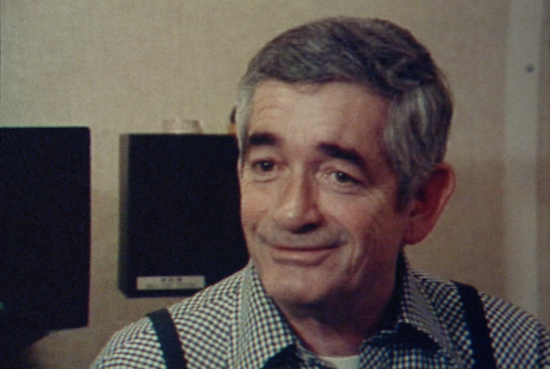
Justin Remer is a frequent wearer of beards. His new album of experimental ambient music, Joyce, is available on Bandcamp, Spotify, Apple, and wherever else fine music is enjoyed. He directed a folk-rock documentary called Making Lovers & Dollars, which is now streaming. He also can found be found online reading short stories and rambling about pop music.
|
| Popular Reviews |
| Sponsored Links |
|
|
| Sponsored Links |
|
|
| Release List | Reviews | Shop | Newsletter | Forum | DVD Giveaways | Blu-Ray | Advertise |
|
Copyright 2024 DVDTalk.com All Rights Reserved. Legal Info, Privacy Policy, Terms of Use,
Manage Preferences,
Your Privacy Choices | |||||||










